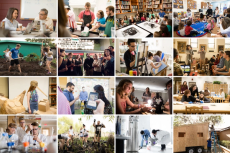Cool Class: Food & Immigrant Cultures in Central Florida
This Intersession course taught Rollins students that just like there’s more to a recipe than a list of ingredients, there’s more to a population than statistics.
February 19, 2019

Think of your favorite meal. You’re probably imagining a lot more than just a recipe. Memory, culture, identity, and food, it turns out, are all closely related. We can learn a lot about the people around us by talking about what we eat—and in a diverse community like Central Florida, food opens a window into a globe’s worth of life experiences. That’s the theory behind an anthropology course taught over Intersession, the week before the spring semester starts. Or, put another way: Everybody likes to eat.

Instructor
Rachel Newcomb, professor of anthropology
The Scoop
As an anthropologist, Rachel Newcomb knows that food plays a significant role in personal and cultural histories, and as a Central Floridian, she knows that immigrants contribute a great deal to the local community. She designed this course to explore the intersection of these two truths. Students spent the five-day course listening to firsthand accounts of immigrants’ experiences, sharing their own food-informed histories, and tasting—and cooking—traditional foods from around the world.
Every day, guest speakers—home cooks from immigrant communities around Central Florida—joined the class to share a meal and a personal story. The format created a bond among the students that even surprised Newcomb.

“Sometimes when you’re teaching in a regular semester it takes weeks, if not months, to build that kind of community, but this was pretty instantaneous,” says Newcomb. “We were meeting four to five hours a day and having pretty personal discussions about our own backgrounds and where we came from. I feel like I was surprised at how nicely food served as a way to get people familiar with one another.”
The class also involved homework: dining at immigrant-owned restaurants. “I wanted to try and humanize the migrant populations in our area as much as possible,” she says. “A lot of times students will not have met them, and they’re really surprised to learn how diverse and international our area is.”
Snapshot
Joane Allonce, who works as a professional chef in Orlando, joined the class to speak about her experience as a Haitian immigrant. Allonce came to the U.S. prior to the 2010 earthquake in Haiti, but Newcomb goes on to explain that the nearly 59,000 Haitian migrants who fled after the devastating earthquake and had received temporary protected status from the U.S. government are now in jeopardy of losing that respite. She hopes the students take away the message that there is more to a person’s story than historical facts and statistical figures.

To help share her story, Allonce brought pickled cabbage, a traditional Haitian dish that no one in the class had tasted before.
“There were two versions. One was spicy, one was supposed to be not so spicy,” remembers Shannon Sullivan ’20. “I tasted the not-as-spicy version—and my mouth is still on fire!”
Newcomb says that’s exactly the kind of interaction that will help inform her students’ future worldviews. She emphasizes how much we can learn about a culture through what they eat and by talking to them about the importance of food in their lives.
Student Perspective
Shannon Sullivan ’20 says she sought this class out—and not just for the free lunch.
“I had taken a couple of other courses with Dr. Newcomb, and I really like her teaching style,” she says. “Her classes are very interactive. In this class, we cooked with each other, we heard from guest speakers. On those days, Dr. Newcomb was a student like the rest of us.”
Sullivan, an international relations and Spanish double major, says she left the class with a new appreciation for the immigrant community in her backyard and a desire to learn more.
“After this class, I’ll definitely go back to the restaurants I tried. I would encourage everyone to break bread with one another.”
Did You Know?
In Orlando, 14 percent of the population is foreign-born. This number is comprised of people from around the world, including Mexico, Colombia, Haiti, the Philippines, India, Vietnam, Germany, Italy, Egypt, South Africa, and more.
- Categories:
- Cool Classes |
- Anthropology |
- Academics

Recent Stories
March 02, 2026
Rollins Announces Rick Goings Institute for Management and Executive Leadership
The Institute is under construction alongside the Rollins Museum of Art, both of which are expected to be completed in fall 2027 as part of the Innovation Triangle with The Alfond Inn - Orlando Business Journal.
February 27, 2026
Black History Month Celebrates 100 Years
Dean of Religious and Spiritual Life at Rollins College, Harold “Dorrell” Briscoe, discussed the 100-year anniversary of Black History Month, why it started, who started it, and why it’s important today on Central Florida Public Media’s ENGAGE (28:57)
February 26, 2026
Communication Professor Breaks Down Social Media Algorithms
Rachel Winter, a lecturer in communication and director of the Strategic Communication Master’s Program at Rollins College, provided expertise on social media algorithms to FOX 35.
